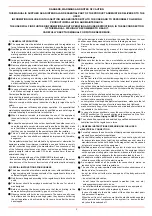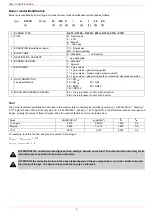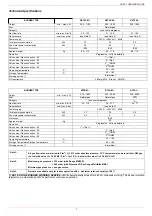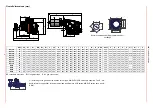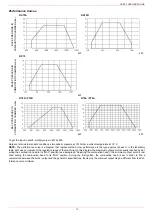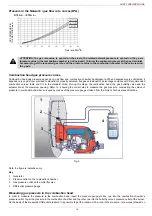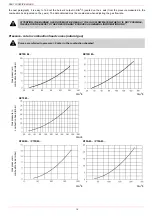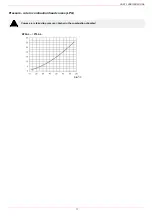
3
3b) FIRING WITH GAS, LIGHT OIL OR OTHER FUELS
GENERAL
The burner shall be installed by qualified personnel and in compliance
with regulations and provisions in force; wrong installation can cause
injuries to people and animals, or damage to property, for which the
manufacturer cannot be held liable.
Before installation, it is recommended that all the fuel supply system
pipes be carefully cleaned inside, to remove foreign matter that might
impair the burner operation.
Before the burner is commissioned, qualified personnel should inspect
the following:
a the fuel supply system, for proper sealing;
b the fuel flow rate, to make sure that it has been set based on the firing
rate required of the burner;
c the burner firing system, to make sure that it is supplied for the desig-
ned fuel type;
d the fuel supply pressure, to make sure that it is included in the range
shown on the rating plate;
e the fuel supply system, to make sure that the system dimensions are
adequate to the burner firing rate, and that the system is equipped with
all the safety and control devices required by the regulations in force.
When the burner is to remain idle for some time, the fuel supply tap or
taps should be closed.
SPECIAL INSTRUCTIONS FOR USING GAS
Have qualified personnel inspect the installation to ensure that:
a the gas delivery line and train are in compliance with the regulations
and provisions in force;
b all gas connections are tight;
c the boiler room ventilation openings are such that they ensure the air
supply flow required by the current regulations, and in any case are
sufficient for proper combustion.
Do not use gas pipes to earth electrical equipment.
Never leave the burner connected when not in use. Always shut the
gas valve off.
In case of prolonged absence of the user, the main gas delivery valve
to the burner should be shut off.
Precautions if you can smell gas
a do not operate electric switches, the telephone, or any other item likely
to generate sparks;
b immediately open doors and windows to create an air flow to purge the
room;
c close the gas valves;
d contact qualified personnel.
Do not obstruct the ventilation openings of the room where gas
appliances are installed, to avoid dangerous conditions such as the
development of toxic or explosive mixtures.
DIRECTIVES AND STANDARDS
Gas burners
European directives
-Regulation 2016/426/UE (appliances burning gaseous fuels)
-2014/35/UE (Low Tension Directive)
-2014/30/UE (Electromagnetic compatibility Directive)
-2006/42/EC (Machinery Directive)
Harmonized standards
-UNI EN 676 (Automatic forced draught burners for gaseous fuels)
-EN 55014-1 (Electromagnetic compatibility- Requirements for house
hold appliances, electric tools and similar apparatus)
-EN 60204-1:2006 (Safety of machinery – Electrical equipment of
machines.)
-CEI EN 60335-1 (Specification for safety of household and similar
electrical appliances);
-CEI EN 60335-2-102 (Household and similar electrical appliances.
Safety. Particular requirements for gas, oil and solid-fuel burning
appliances having electrical connections).
-UNI EN ISO 12100:2010 (Safety of machinery - General principles for
design - Risk assessment and risk reduction);
Light oil burners
European directives
-2014/35/UE (Low Tension Directive)
-2014/30/UE (Electromagnetic compatibility Directive)
-2006/42/EC (Machinery Directive)
Harmonized standards
-UNI EN 267-2011(Automatic forced draught burners for liquid fuels)
-EN 55014-1 (Electromagnetic compatibility- Requirements for house
hold appliances, electric tools and similar apparatus)
-EN 60204-1:2006 (Safety of machinery – Electrical equipment of
machines.)
-CEI EN 60335-1 (Specification for safety of household and similar
electrical appliances);
-CEI EN 60335-2-102 (Household and similar electrical appliances.
Safety. Particular requirements for gas, oil and solid-fuel burning
appliances having electrical connections).
-UNI EN ISO 12100:2010 (Safety of machinery - General principles for
design - Risk assessment and risk reduction);
National Standard
-UNI 7824 (Atomizing burners of the monobloc type. Characteristics and
test methods)
Heavy oil burners
European Directives
-2014/35/UE (Low Tension Directive)
-2014/30/UE (Electromagnetic compatibility Directive)
-2006/42/EC (Machinery Directive)
Harmonized standards
-UNI EN 267(Automatic forced draught burners for liquid fuels)
-EN 55014-1 (Electromagnetic compatibility- Requirements for house
hold appliances, electric tools and similar apparatus)
-EN 60204-1:2006 (Safety of machinery – Electrical equipment of
machines.)
-CEI EN 60335-1 (Specification for safety of household and similar
electrical appliances);
-CEI EN 60335-2-102 (Household and similar electrical appliances.
Safety. Particular requirements for gas, oil and solid-fuel burning
appliances having electrical connections).
-UNI EN ISO 12100:2010 (Safety of machinery - General principles for
design - Risk assessment and risk reduction);
Norme nazionali / National Standard
-UNI 7824 (Atomizing burners of the monobloc type. Characteristics and
test methods.
Summary of Contents for P75R
Page 53: ...Service manual AZL2x LMV2x 3x Burner Management System M12916CD Rev 3 4 03 2023...
Page 60: ...8 Parameters level heating engineer...
Page 102: ...50 ERROR CODE TABLE...
Page 103: ...51...
Page 104: ...52...
Page 105: ...53...
Page 106: ...54...
Page 107: ...55...
Page 108: ...56...
Page 109: ...57...
Page 110: ...58...
Page 111: ...59...
Page 112: ...60...
Page 113: ...61...
Page 114: ...62...
Page 115: ...63...
Page 116: ...64...
Page 121: ......
Page 122: ......
Page 123: ......
Page 125: ...IG FU B...
Page 126: ......
Page 127: ......
Page 128: ......
Page 129: ......
Page 130: ......
Page 131: ......
Page 132: ......
Page 133: ......
Page 134: ......
Page 135: ......


